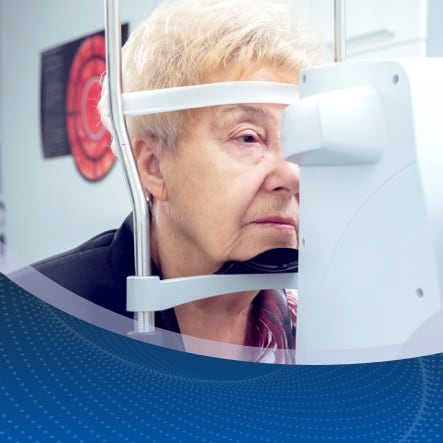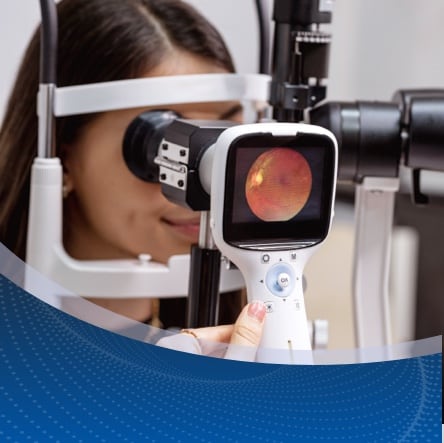Cataract surgery can help remove the cloudy lens affecting your vision and improve your sight. If you receive this procedure, is blurry vision normal after surgery? When should you contact your eye doctor?
Continue reading to learn more about cataracts, including if foggy vision is normal after cataract surgery. Let’s start by learning more about cataracts and cataract surgery in general.
What is a Cataract?
A cataract is the clouding of your eye’s lens, an essential part of your vision. Your lens is typically clear and flexible, changing shape to help you see. This lens can become stiff, thicker, and cloudy as you age.
Cataracts develop with time as proteins and fibers within your lens break down and clump together, causing blurry vision. A cataract can feel like you’re looking out of a foggy or frosty window.
You may see fine when a cataract develops, but vision worsens with time. When cataracts significantly affect your vision, cataract surgery is usually the only way to restore your sight.
Cataract Surgery
Cataract surgery is a procedure for replacing your clouded lens with an artificial lens, providing clearer vision. Your doctor makes a small incision in the front of the eye to access the lens, using specialized instruments to break it apart and easily remove it. Your doctor then inserts your artificial lens, improving your vision.
How Long Does Vision Stay Blurry After Cataract Surgery?
You don’t need to panic if you have blurry vision for a few days after surgery. Blurry vision is a common reaction to cataract surgery because your eyes need time to heal and adjust to the lens your doctor implanted.
Blurry vision after cataract surgery can vary from patient to patient—some people may have blurry vision for a day, while others experience blurriness for several days. While blurry vision after cataract surgery is normal, blurred vision for weeks is concerning.
Here’s what Dr. Peter Mitrev, Board-certified Glaucoma Specialist & Lens Replacement Surgeon at Griffey Eye Care & Laser Center, says,
“The usual cause of blurred vision following uncomplicated cataract surgery is due to the normal healing process of the eye. Depending on the degree of cataract and the complexity of the case it may take patients a few days to a few weeks to achieve their best vision after surgery. The medication schedule can be tailored to the individual’s response to surgery. Additional medications may be added to the usual regimen of post-operative eye drops to manage conditions such as elevated eye pressure or corneal swelling. These will be determined by the eye physician at the time of the visit.”

When Is Blurry Vision a Concern?
Blurry vision is common after cataract surgery for a few days, but continued blurred vision 2 years after cataract surgery can mean you’re experiencing a problem. Several factors related to cataract surgery can cause blurry vision, with some being more common than others. If it continues, your doctor can help determine the cause of your blurry vision.
Possible Cataract Surgery Complications
Are you wondering, “Why is my vision getting worse after cataract surgery?” Here are the most common possible complications for foggy vision after cataract surgery:
Cystoid Macular Edema
Cystoid macular edema (CME) is a potential complication of cataract surgery where the macula, the center of your retina, becomes swollen. Macular swelling causes blurry and distorted vision, making it harder to see.
CME affects approximately 2% of patients, and this condition is treatable. Your doctor can prescribe anti-inflammatory eye drops to help resolve CME within a few months.
Dry Eyes
Dry eyes are possible after cataract surgery for many patients. Previous research found that dry eyes can happen for several reasons:
- Disruption of the tear film during surgery
- Fewer tears—caused by the surgeon making an incision in the eye during surgery
- Steroid eye drop use during the surgical process
Over-the-counter eye drops called artificial tears are one way to relieve dry eyes after cataract surgery. These eye drops are similar to natural tears and help provide temporary moisture.
Inflammation
Inflammation in the eye can happen after cataract surgery, but it is typically harmless. Any inflammation within the eye following cataract surgery is the body’s natural response to having the eye’s lens removed. This reaction causes blurry vision, but your eye doctor can prescribe medication to help.
Inflammation should resolve as you recover from surgery, and you can expect a general improvement within a few days. Speak with your doctor if inflammation continues or worsens after surgery.
Posterior Capsular Opacification
Posterior capsular opacification (PCO) is a potential complication of cataract surgery. Sometimes called a “secondary cataract,” PCO is a cloudy film growing over the portion of the eye where your artificial lens sits. PCO can cause blurry or distorted vision.
Cloudy vision after cataract surgery is relatively common for patients receiving cataract surgery. Approximately 20% of patients experience PCO within 2–5 years of their procedure. However, a quick surgery known as posterior capsulotomy can help restore your vision.
Retinal Detachment
Retinal detachment happens when your retina pulls away from its original position in the eye. This condition causes blurry, distorted vision. While rare, retinal detachment is a risk of cataract surgery.
Research in 2018 discovered that approximately 0.7% of patients experience retinal detachment after cataract surgery. While this number is low, patients must be aware of this risk—retinal detachment can lead to permanent vision loss.
Learn More About Cataract Surgery
Cataract surgery can let you see clearly again, helping provide an artificial replacement for your clouded lens. You may have questions about this procedure, and your eye doctor can help. They can address any questions or concerns you may have. Contact Griffey Eye Care if you have questions about cataract surgery or if you’re interested in this treatment.














